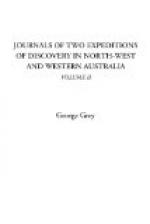At the end of the three hours I again begged several of the party, who appeared to be in an exhausted state, to abandon a portion of their useless loads; but they were quite sure that by making short marches, not exhausting their strength, and now and then halting for a day or two to refresh, they could carry them into Perth, and therefore refused to part with them. Mr. Smith and myself found that stopping in this way and getting cold rendered our limbs so stiff and painful when we walked on again that we could scarcely move; and I suspect that such was the case with the other men, for when we started again I could hardly get them along. One man of the name of Stiles, who was a stout supporter of the new theory, made us stop for him nearly every five minutes.
The Bowes river.
After walking one mile we fortunately came to a very deep valley, having such steep limestone cliffs on each side that it assumed quite the character of a ravine: it was about a mile wide and in it was a watercourse winding through deep flats. We however only found water in pools; the course of the stream was very tortuous and its mouth was almost blocked up by sandhills. The valley itself was both picturesque and fertile, and the appearance of the country to the east and north-east was highly promising. The stream I called the Bowes.
Native resting-place. Native huts.
This spot was a favourite halting-place of the natives; and from the number of huts and other indications which we saw the district must be very densely populated. The huts were of the same superior construction as those which we had seen near the Hutt, and the traces were very recent, but the natives themselves were either at a distance or kept carefully out of our way. The valley that we were now in, as well as the other limestone valleys in this province, partook exactly of the character of those in the carboniferous limestone districts of England inasmuch as they were deep gorges, or ravines, now traversed by watercourses or streams apparently much too insignificant to have grooved them out.
Provoking indolence of the men.
Our finding water here was fortunate for I now showed the men that, had they walked one mile farther instead of halting in the manner they had done, they would have had abundance of it, and would have been, at this moment, at least, five miles nearer home. I also directed Mr. Walker to examine Stiles and to state whether he was in good health or not. He did so and reported him quite well. I therefore when we started again gave Stiles warning that I should not halt every minute for him but would leave him behind, at the same time ordering him to walk in front of the party, next after me.




